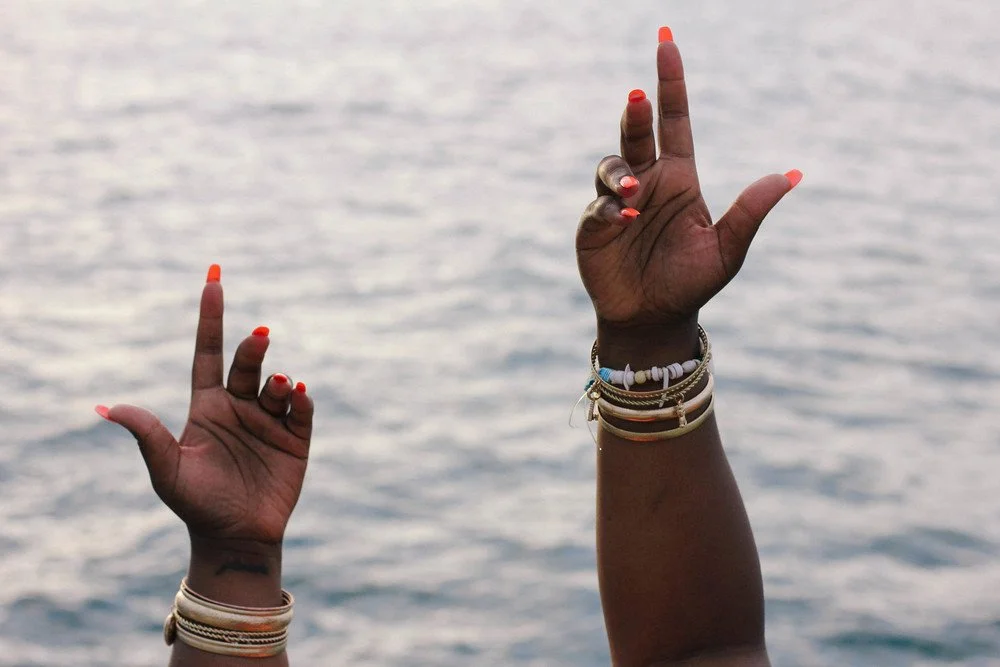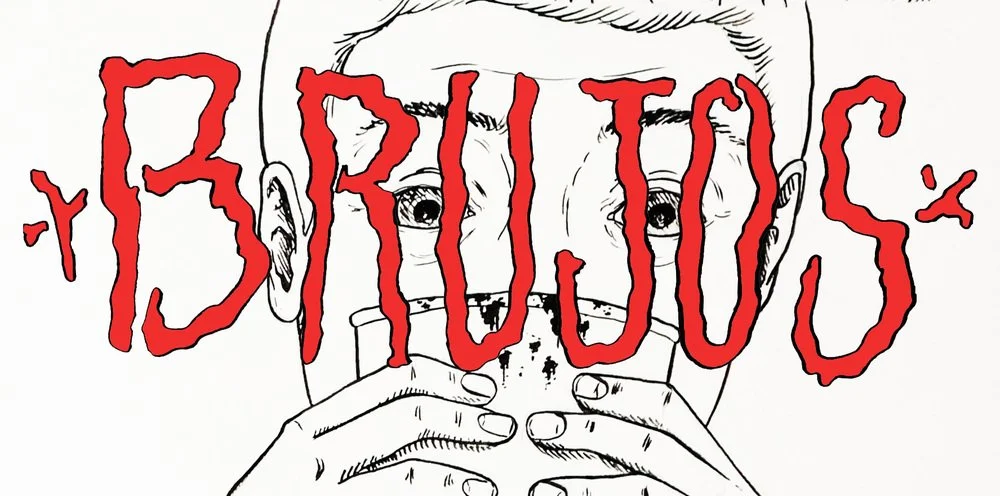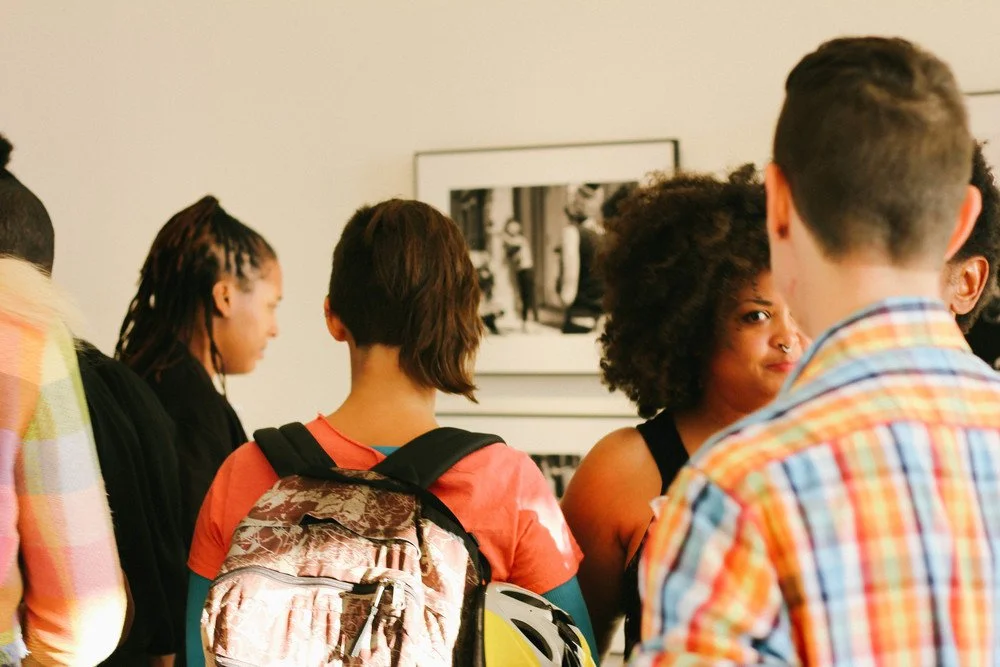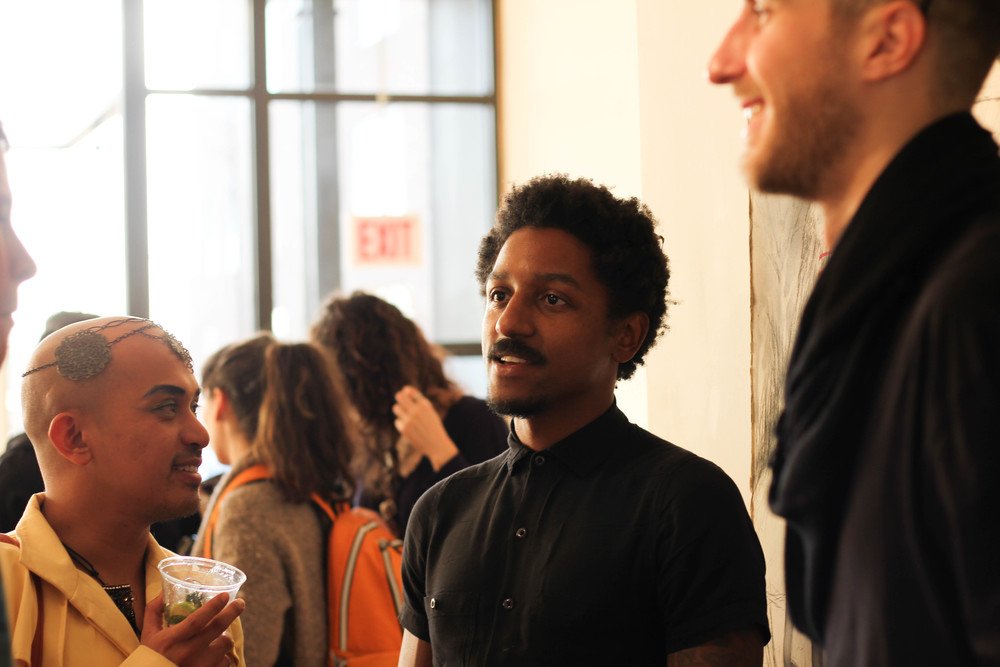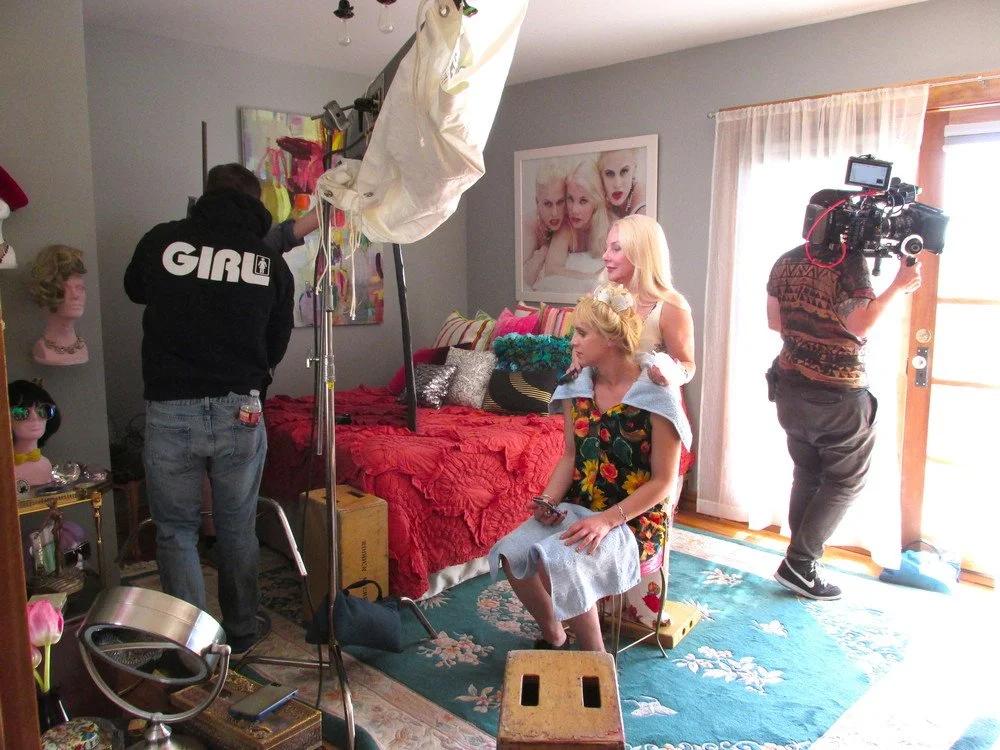
inside OTV | 2015
HOW IS OPEN TV DEVELOPING?
By Aymar Jean Christian
January 1, 2016
This time last year Open TV beta did not exist. It was a series of pilots called Wide Open, of which Nupita Obama Creates Vogua was to the be first. We shot Vogua in December and that same month Sam Bailey emailed me looking for help with You’re So Talented. In three months I expanded Wide Open from a series of pilots to a platform with three content verticals, where one of three is a series of pilots. Open TV beta went public in March with You’re So Talented as our first original series.
Open TV is a scholarly research project in television development. Development involves organizing production and marketing completed projects. I’m experimenting with arts-based methods for understanding cultural production and distribution by queer, trans and cis-women and artists of color across media and technology.
I want Open TV to be different than most social science experiments. It has to be. The “subjects” are almost all working artists in the city I live in. They’re my community, so I have to be as honest and clear as possible in what I’m doing and why. I have to be open about how I’m developing TV.
PART I: INTRODUCING THE DEVELOPMENT REPORT AND OFFICE HOURS
At least twice a year I will write a development report on how Open TV is developing. We’re about nine months since the beginning. Forgive the delay. I find myself apologizing for delays to a lot of people of late, and that’s just one reason I want to write these reports: to explain what’s taking up so much of my time. Ethically I cannot call this platform more “open” than television unless I am public with my development decisions, something all corporate networks are not: we only sometimes know why shows are greenlit, cancelled or renewed (most of what we know is completely driven by numbers).
Open TV is explicitly in “beta.” I’m borrowing this term from the tech world, where some argue it’s so overused to the point of losing all meaning. Indeed, I cannot imagine a point where Open TV is not in beta, though I am working towards it. Why? We’re developing small-scale television, where there is not much funding or institutional support. Part of my goal is to attract more funding, and we’re already doing that, but there are vast inequalities in media and art worlds that will take years and years to undo (and by some measures it’s only getting worse).
Right now, Open TV is a part-time operation. My full-time job is as a professor, where I have to write and teach. My heads of production (Stephanie Jeter), marketing (Elijah McKinnon), artist/community development (Kemi Adeyemi) and exhibition (Nicole Morse) all have other jobs. As such, the development process will have inefficiencies, delays and issues that need to be regularly accounted for and fixed.
The best way to do that is to provide a space for folks to get updated on what’s been happening and ask for feedback. You can email me at developer [at] weareopen [dot] tv. I updated and integrated all my email addresses in September, so now I received and read all emails. If you don’t get a response within two weeks, send it again because something weird has happened!
However, if you’d like to schedule a meeting with me to talk something over, we are introducing Office Hours! Every Wednesday from 8AM – 10AM Central I will be online available for a Google Hangout to talk over your project or interest face-to-face. Signing up is easy, just use this link, via Calendly, and select open slots (highlighted).
THE STATE OF OPEN TV
I’ve been surprised about the demand for a platform like Open TV. When I first started I was very afraid I didn’t have enough money and Chicago didn’t have enough artists interested in video.
I was wrong, on both counts.
ARTISTS
In a little more than nine months we have launched three pilots under Open TV Presents – Nupita Obama Creates Vogua, Southern for Pussy, and Let Go and Let God – and two series under Open TV Originals – You’re So Talented and Futurewomen. 2016 kicks off with our next docu-series, The Bronx Cunt Tour, our newest drama, Full Out and the second season of You’re So Talented. The Open TV Re-Presents vertical, where we will syndicate existing web series, will debut in the summer with work by Kalup Linzy. The Open TV Community vertical includes profiles and coverage of everything Open TV, and more.
Rashida KhanBey's Let Go and Let God, part of Open TV Presents. Photograph: Zakkiyyah Najeebah
When I started Open TV I was afraid I’d run out of content, so I produced a lot of our early programming and took meetings with almost two dozen artists before the platform even premiered. With the exception of You’re So Talented, I have a credit on all of our early series. This is one of the reasons why, if you’ve recently entered development with me or try to submit a work for consideration, I haven’t been working as fast as I’ve wanted to. (The other reasons being I’ve been revising my first book, which I resubmitted in August, and I still have responsibilities to Northwestern, despite a partial leave from teaching). Looking forward I am trying to cultivate producers and not produce shows myself.
The demand from artists in Chicago has already exceeded my capacity to produce and fund series. This is great news! But it means new projects may take longer to materialize. Part of the reason is that I met with a lot of artists in the early months to make sure I had content coming in after You’re So Talented was over. The series we’ve released so far stem from these early conversations.
How did I choose these early, select artists? They are almost all artists across disciplines – performance, dance, storytelling, film/video, music – who I had seen perform or exhibit work in my years in Chicago since 2012. Some I met through referrals from other artists or curators. Some just emailed me out of the blue, or caught me at one of our events, and pitched me an idea. They all met my demographic criteria, meaning they identify as or with queer, trans, cis-women or artists of color.
Unlike TV networks – whether ABC or Netflix – diversity is integral to Open TV’s development. I’m looking for a range of artistic disciplines (dance, theater, music, etc.) and identities (racial and sexual identity, gender expression, primarily but also class, age, religion, disability, citizenship status). This is an ongoing process. I need to constantly challenge myself to think expansively about identity, and yet I also need to work with folks in Chicago who are exhibiting work I can see or who are tapped into my growing network of artists and collaborators. I’m not divorced from inequalities, and I am shaped by my own biases, social position and professional demands.
MONEY
To date I have spent roughly $20,000 producing and licensing original programming for Open TV. Those funds have led to the completion and release of the three pilots and two series, along with the licensing and production an additional three due in 2016. All told this is about two and a half hours of original programming, for which I paid the creative talent (artists, writers, photographers, actors) and production crew (editors, camera-persons, sound technicians).
Much of our funds are for “work for hire,” with the exception of the creators of the series, who sign a one-page letter of agreement to receive a licensing fee for Open TV’s right to distribute their intellectual property non-exclusively (meaning after we premiere it they can show it wherever or sell it to whomever). I have a lot of reservations about supporting freelance labor. And yet, I believe I am paying artists enough money for it to be worth their time, because they are given creative control, supporting other artists they believe in and know their work will be showcase in a non-commercial, art and academic context, where it brings value to them in other arenas.
Orlando Camacho is drawing a graphic novel based on Ricardo Gamboa's Brujos
SUCCESSES
I’m very pleased with our output so far. We have been able to premiere one new video each month since March, and we are on track to keep that up through Spring.
I’m not too focused on our numbers in these early stages of Open TV. We’re new, and it takes time for new, indie work to circulate online. Many successful web series, including Broad City, were little seen in their first season. Still, with our two and a half hours programming, we’ve garnered 40,000 plays, over 150 likes and 110 followers on Vimeo. We’ve added over 300 people to our monthly newsletter, the Open TV Program. Not bad!
I’m very proud that Open TV projects have been screened and exhibited in a variety of academic, artistic and community venues. It’s important for us that Chicagoans get to see our pilots before the world does, and each premiere screening includes a performance, Q&A or workshop from the artist.
You're So Talented producer Samantha Lee and creator Sam Bailey at the 2015 Tribeca Film Festival Filmmaker Welcome Party
You’re So Talented was selected as part of the 2nd Annual Tribeca Film Festival’s N.O.W. Program, premiering its 4th episode exclusively at tribecafilm.com. It has also screened at the School of Art Institute’s Intersectionality Critique Exchange (first episode sneak peek in March) and the Smart Museum of Art at the University of Chicago (all of season one). Nupita Obama screened in Lakeview (Wangs), Wicker Park (Canvas), and Pilsen (1618W17) and was covered by the Windy City Times. Futurewomen premiered at the University of Chicago’s Logan Center as part of Honey Pot Performance’s residency. It screened again at Global Girls’ Studio and the Community Film Workshop in October as part of Collected Voices: Chicago’s Ethnographic Film Festival. Zackary Drucker’s Southern for Pussy premiered in an exhibit at the Cooper Gallery in New York (covered by Buzzfeed and Artnet) and in the offices of TransTech Social Enterprises in Chicago. Brujos, a series by Ricardo Gamboa we’re developing by commissioning a graphic novel, staged a reading of the first season and a premiere of the first episode of the novel at La Catrina Café in Pilsen.
Nicole Melanie Davis of Mindful Indulgences provided organic, vegan, gluten-free desserts at our Chicago Artists Month featured event at Woman Made Gallery, Open TV: Pilots By Women and Feminine-Spectrum Artists. Photo: Zakkiyyah Najeebah
Myself, talking with Kiam Marcelo Junio, Chicago Artists Month feature artist and star of Open TV Presents: Nupita Obama Creates Vogua, and Zac Hall, who designed floral arrangements for the event at Woman Made Gallery
In November we had our most ambitious event to date: Open TV: Pilots by Women and Feminine-Spectrum Artists, hosted by Woman Made Gallery and featured by the city of Chicago’s Department of Cultural Affairs and Special Events as part of Chicago Artists Month. We screened our first four scripted pilots, including the premiere of Let Go and Let God. Kiam Junio, recognized as a featured artist for Chicago Artists Month, joined guests in a lively conversation with Rashida KhanBey, Zakkiyyah Najeebah (director of photography, Let Go and Let God) and Alexa Grae (composer, Let Go and Let God). We commissioned an original participatory performance/video installation by Rashayla Marie Brown, “Immediate Intimacy,” where she interviewed guests on their views on reality television as part of her video series, Reality Is Not Good Enough. We had food curated by Eli’s upcoming Open TV series Two Queens in a Kitchen and desserts by Nicole Melanie Davis of Mindful Indulgences. All of these artists are Chicago-based and regular contributors to the city’s cultural life.
Behind-the-scenes shot of Zackary Drucker and Penny Sori's pilot for Open TV Presents: Southern for Pussy, which has screened in galleries in New York (Cooper Gallery) and Chicago (Glass Curtain).
Open TV and our participating artists are already receiving recognition. Our Woman Made Gallery event was one of 20 official featured events, among hundreds, in Chicago Artists Month. Nicole Lane, a writer for Bitch magazine, came to the event and wrote up an interview with me, the first coverage of Open TV as a platform! At the Collected Voices film festival, another featured event, Futurewomen took home the award for best cinematography for a documentary. Later this month You’re So Talented will compete for a Gotham Award for Breakthrough Short Format Series; this year the 25th annual show produced by the Independent Film Project is expanding beyond the Oscar-derby to recognize long and short format television!
WHAT I NEED TO WORK ON
Despite Open TV successes, there’s still a lot we need to work on. Going forward I’m focusing on two key areas: capacity and accessibility.
CAPACITY
Open TV is a part-time platform. I work as a professor; while research (Open TV) is part of my job, teaching and service to the university are as well. I have missed important events because of university responsibilities. My inbox is a constant struggle. My support staff are also part-time.
For this reason we are constantly managing time, and we’re all stretched thin. In recent weeks I’ve been hiring graduate students help to ease our stress in artist and community development, getting folks to collect reception data of our work and help artists raise money for projects.
Right now, the development process is long. In some cases it’s more efficient than television. But because our marketing team is part time, I cannot take on too much, too fast. I’ve sensed just a little frustration among some artists who find it difficult to schedule a meeting. Of course, they want to make their projects as soon as possible. I have to go slow. This is because I can’t launch more than one or two new videos a month, or else I’m doing a disservice to the artists I’m already working with. I encourage any artist who’s on a faster timeline than we can promise to work on your project anyway and seek other support; if you can’t find it, Open TV will be here. I’m starting to use the analogy of slow food for Open TV. People think the web is fast, but anyone’s who built any enterprise knows it takes time. That said, projects with a clear plan and team in place can move quickly; almost all our existing projects were conceived, funded, shot and edited in 6-9 months.
ACCESSIBILITY
We have not significantly addressed the accessibility of Open TV. This goes from most of our videos lacking subtitles to the wheelchair accessibility of our events (some are, some aren’t) to lacking a clear way for users to report design flaws on our website. Accessibility is not merely about compliance with laws but about being receptive and active in adapting to the many ways diverse communities and individuals access media texts. Some of these more basic features will be on Open TV in 2016 and if you have any suggestions please email me.
In 2016 we are introducing a button on the website available for anyone to tell us what their experience of the site is so we can accommodate a greater diversity of uses we might not be aware of as a small operation.

